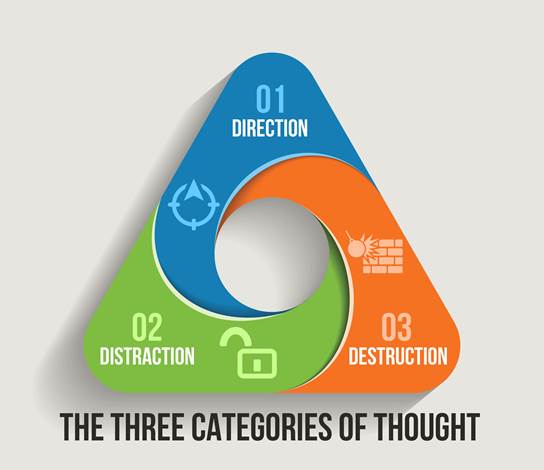As a person who studies human behavior, I am fascinated by recurring patterns. One of the most fascinating is how people’s lives are the direct reflection of their thought process. Every single thought you have ever had falls into one of three categories:

1. Direction
This thought is the driving force to all progress. When our thoughts are directed toward a specific outcome, we become aligned with our infinite potential. It is the directed thought that says, I will build a business. It is the directed thought that says, I will quit smoking. It is the directed thought that says, I want to marry her.
The directed thought is the lifeblood to our future. The directed thought is a decisive statement, but it can also be a line of strategic questioning: How can I contribute more? How can I make this day amazing? How can I show this person love? It is the pathway of clarity that opens our minds to solutions instead of problems.
Related: 7 Practical Tips to Achieve a Positive Mindset
2. Distraction
If direction is the path, distraction is freedom from the path. Freedom can take many forms, from watching TV to enjoying nature. Contrary to what many believe, distraction can be highly beneficial. That freedom is a human need that allows us to re-energize and focus our energy once again on a directed thought. Distraction, if used appropriately, can be therapeutic. For example, distraction can be used to balance the mind and assure us we are not prisoners of the goal we are chasing. Distraction can also be used as a steppingstone away from destructive thoughts.
We have the ability to use this freedom as a powerful tool, but we should never forget that freedom is a wild animal. That animal can be loyal to us or it can assert its dominance over us. As soon as we become beta to its command, distraction becomes a means to avoid the necessary.
3. Destruction
We are either directed toward positive intent or we are directed toward negative intent. Destruction is the negative intent. This is where people take on victim mentalities, guilt, blame, judgment, criticism, neediness, anger, sadness and other low-quality emotions. These are the thoughts that are decisively limiting: I am not enough. It’s my fault. These are also the questions that lead to those limiting answers: Why me? Why does nothing ever seem to work?
We have all visited each corner of the triangle, and we have decided to frequent two corners on a regular basis. One of them is most likely distraction. I say this with confidence because direction and destruction are energy-intensive thought processes on the human brain. In order to balance that, our brain needs rest and relaxation. Therefore it is unlikely for a person to have thoughts that are directed and destructive. I have never heard the saying Life is amazing. I hate myself. Now the question becomes which is your second category of thought?
If you identified your second category of thought as direction, great! Keep in mind that everybody needs rest and relaxation. If your life is all work and no play, then go spend time with your loved ones or connect with nature. Choose a high-quality distraction; it feels better than reality TV.
If you identified destruction as your second category of thought, that’s OK. Take a moment to breathe and recognize that you are human, just like the rest of us. We are all beautifully imperfect. Take a few more breaths and ask yourself a directed question. Many people see a dead end and think, That’s it. But you have an opportunity to turn it around. You can use your energy to make a destructive close-ended statement such as, I hate myself, or you can use your energy to make an open-ended directed question such as, How can I love myself more? Both require the same amount of energy. Whether you decide to focus on the problem or the solution, it’s up to you.
And remember, the shortest distance between each corner on the triangle is a single thought.
Related: Say This, Not That: 7 Responses for Common Negative Thoughts





